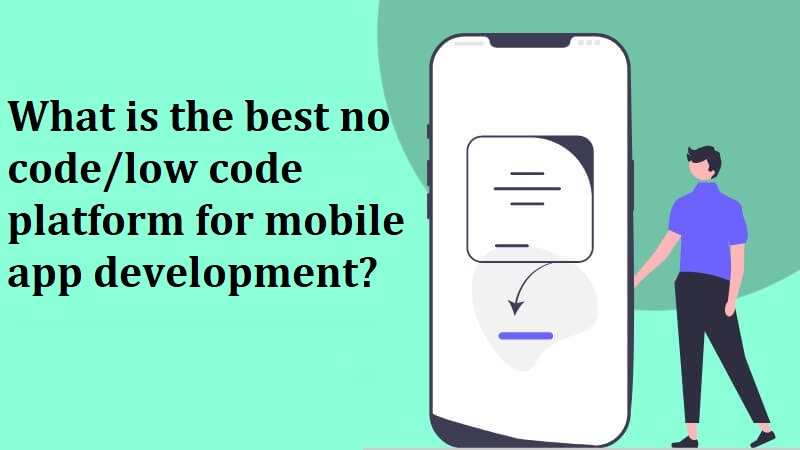In today’s fast-paced digital world, mobile app development has become a crucial aspect for businesses and individuals alike. However, not everyone possesses coding expertise or the resources to hire professional developers. This is where no-code/low-code platforms come into play, offering a simplified approach to app development. In this article, we will explore the best no-code/low-code platforms available in the market and discuss their key features, benefits, and limitations.
- Introduction
Mobile app development has traditionally been a complex and time-consuming process, requiring extensive coding knowledge and technical skills. No-code/low-code platforms have revolutionized this landscape by providing intuitive interfaces and drag-and-drop functionalities, enabling individuals with little to no coding experience to create powerful mobile applications.
- Understanding No-Code/Low-Code Development
No-code/low-code development refers to the process of building applications using visual interfaces and pre-built components rather than writing traditional lines of code. These platforms typically offer a wide range of templates, modules, and plugins that allow users to customize their app’s functionality and design without diving into complex coding languages.
- Benefits of No-Code/Low-Code Platforms
Using a no-code/low-code platform for mobile app development offers several advantages:
Speed and Efficiency: No-code/low-code platforms accelerate the development process by eliminating the need for extensive coding. This results in quicker time-to-market for your app idea.
Cost-Effectiveness: By reducing reliance on professional developers, no-code/low-code platforms significantly lower development costs, making app creation more accessible for businesses and individuals on a limited budget.
User-Friendly Interface: These platforms prioritize user experience, providing intuitive drag-and-drop interfaces that simplify the app development process and require minimal training.
Flexibility and Customization: No-code/low-code platforms offer a wide array of pre-built components, templates, and integrations, allowing users to tailor their app to specific requirements and business needs.
Rapid Prototyping and Iteration: With quick deployment and easy modification capabilities, no-code/low-code platforms enable rapid prototyping and iteration, facilitating faster feedback and improvements.
- Top No-Code/Low-Code Platforms for Mobile App Development
Now let’s delve into some of the best no-code/low-code platforms available for mobile app development:
4.1 AppSheet
AppSheet is a powerful no-code platform that empowers users to build feature-rich mobile apps without writing a single line of code. It offers seamless integration with various data sources, including spreadsheets, databases, and cloud services. AppSheet’s AI-powered features automate app creation and allow for complex logic and workflows.
4.2 Bubble
Bubble is a highly customizable no-code platform that provides a visual interface for building web and mobile applications. Its drag-and-drop editor and extensive plugin library enable users to create interactive and dynamic apps. Bubble also offers a collaborative environment for team-based development.
4.3 Adalo
Adalo is a user-friendly no-code platform focused on mobile app development. It offers a vast collection of pre-built components and templates, allowing users to create visually appealing and functional apps. Adalo supports seamless integration with various third-party services, simplifying the process of incorporating external functionalities.
4.4 OutSystems
OutSystems is a low-code platform renowned for its enterprise-grade capabilities. It combines visual development with traditional coding, offering a comprehensive solution for complex app development projects. OutSystems provides extensive scalability, security, and integration options, making it suitable for large-scale applications.
4.5 Mendix
Mendix is a robust low-code platform that emphasizes collaboration and efficiency. It offers a visual development environment, enabling users to create apps through a combination of visual modeling and code-based customization. Mendix provides built-in AI and machine learning capabilities, enhancing app intelligence.
4.6 Power Apps
Power Apps, part of the Microsoft Power Platform, is a popular no-code/low-code solution for building mobile and web applications. It integrates seamlessly with other Microsoft services, such as SharePoint and Azure, and provides a wide range of connectors for data integration. Power Apps offers extensive customization options and empowers users to create enterprise-level apps.
4.7 Appgyver
Appgyver is a comprehensive no-code platform with a strong focus on front-end development. It offers a visual drag-and-drop builder, real-time preview, and a large component library. Appgyver’s advanced features allow for complex logic and integrations, making it suitable for both simple and sophisticated app projects.
4.8 Glide
Glide is a user-friendly no-code platform specifically designed for creating data-driven mobile apps. It seamlessly connects with Google Sheets, allowing users to leverage spreadsheet data to build interactive apps. Glide’s intuitive interface and extensive customization options make it an excellent choice for startups and small businesses.
4.9 Thunkable
Thunkable is a popular no-code platform that enables the creation of cross-platform mobile apps for both iOS and Android. It offers a visual drag-and-drop interface and supports integration with various third-party services. Thunkable’s extensive component library and active community make it an ideal choice for beginners.
4.10 Appian
Appian is a low-code platform that focuses on delivering powerful enterprise applications with a high level of automation. It offers a visual development environment, business process management capabilities, and extensive integrations. Appian’s robust security features and scalability make it suitable for mission-critical applications.
4.11 Zoho Creator
Zoho Creator is a versatile no-code platform that enables users to build mobile and web applications using a simple drag-and-drop interface. It provides a wide range of pre-built templates, advanced form builders, and third-party integrations. Zoho Creator’s comprehensive feature set and affordable pricing make it a popular choice for small businesses.
4.12 Caspio
Caspio is a low-code platform designed for creating database-driven applications. It offers a visual development environment, powerful data management capabilities, and seamless integrations with various cloud services. Caspio’s scalability and security features make it suitable for applications that require robust data handling.
4.13 BuildFire
BuildFire is a no-code platform that specializes in building mobile apps for businesses, including e-commerce, service, and content-based apps. It provides a drag-and-drop builder, pre-built templates, and extensive customization options. BuildFire also offers features like push notifications, analytics, and user engagement tools.
4.14 Betty Blocks
Betty Blocks is a low-code platform known for its speed and flexibility. It offers a visual interface and supports rapid application development. Betty Blocks enables users to create complex applications with integrations, workflows, and business rules. It also provides deployment options for both cloud and on-premises environments.
4.15 Appery.io
Appery.io is a comprehensive no-code platform for building mobile and web apps. It offers a visual editor, a large library of pre-built components, and seamless integration with backend services. Appery.io supports collaborative development and provides built-in tools for testing and debugging.
- Factors to Consider When Choosing a No-Code/Low-Code Platform
When selecting the best no-code/low-code platform for mobile app development, consider the following factors:
Ease of Use: Look for a platform with an intuitive interface and drag-and-drop functionality that simplifies the app development process.
Customization Options: Ensure the platform offers a wide range of pre-built components, templates, and integrations to meet your app’s specific requirements.
Scalability: Consider whether the platform can handle the growth and complexity of your app as your business expands.
Integration Capabilities: Check if the platform seamlessly integrates with the external services and APIs you need to incorporate into your app.
Community Support: Look for a platform with an active community, forums, and resources that can provide assistance and guidance throughout your app development journey.
Security and Compliance: Evaluate the platform’s security measures and compliance with industry standards to protect your app and user data.
- Conclusion
No-code/low-code platforms have democratized mobile app development, allowing individuals and businesses with limited coding experience to create powerful and customized applications. The best platform for you will depend on your specific requirements, budget, and desired level of customization. Consider factors such as ease of use, scalability, integration capabilities, and community support when choosing a platform. By leveraging these innovative tools, you can bring your mobile app ideas to life efficiently and cost-effectively. GML Soft Labs are one of the top rated mobile app development company in Chennai.
FAQs
Q1. Are no-code/low-code platforms suitable for complex mobile app development?
Yes, many no-code/low-code platforms offer advanced features and capabilities that can handle complex app development requirements. However, it’s essential to choose a platform that aligns with the complexity of your project and provides the necessary customization options.
Q2. Can I monetize apps built with no-code/low-code platforms?
Absolutely! Apps built with no-code/low-code platforms can be monetized through various means, such as in-app advertisements, subscription models, or selling digital goods and services. The monetization options will depend on the specific platform and app features you choose.
Q3. Can I publish apps created with no-code/low-code platforms to app stores?
Yes, most no-code/low-code platforms allow you to publish your apps to major app stores like Google Play Store and Apple App Store. However, it’s important to ensure your app complies with the respective store’s guidelines and policies.
Q4. Are there any limitations to using no-code/low-code platforms for mobile app development?
While no-code/low-code platforms offer numerous advantages, they may have limitations in terms of flexibility and customization compared to traditional coding. Additionally, highly specialized or complex functionalities may require custom coding solutions.
Q5. How can I get started with app development using no-code/low-code platforms?
To get started, choose a suitable no-code/low-code platform based on your requirements and begin exploring its features and documentation. Many platforms offer tutorials, guides, and community forums to help you learn and build your first app.
 seolounge
seolounge
